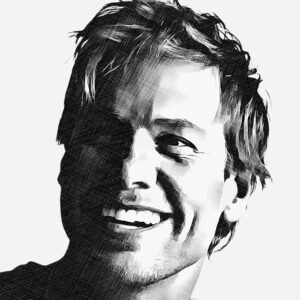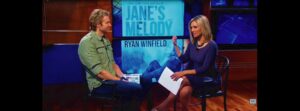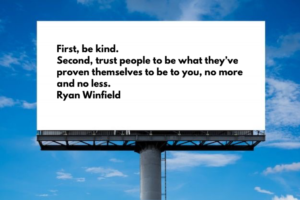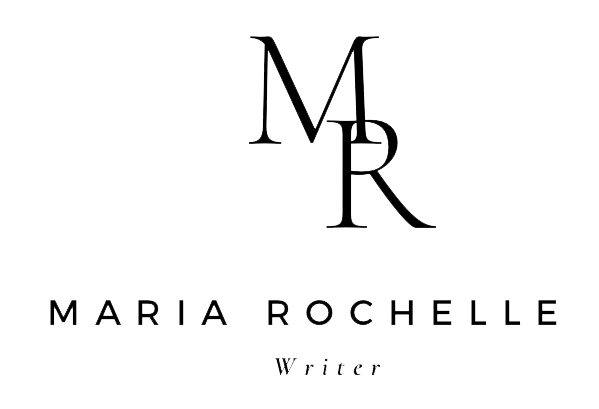
Ryan Winfield grew up in Bellingham, Washington, and at one time was a paperboy. He was in love with books, which is one reason he writes them. He lived in California for a while and the life experience there was research unknowingly he has used for his first book.
He shares with me the challenges from rejection to doubt and joys of being a writer like when the character surprises you, which I can totally relate to that as a writer myself. He mentions to read everything if you want to be a writer. Read on and learn the fun facts he shares with me and more about the joys and challenges of being a writer.
Introducing Ryan…
What do you love about your life right now?
The quiet, both internal and external. I moved from Seattle to nearby Whidbey Island almost ten years ago, having no idea then just how much the noise and grind of city life was wearing on me. I’ve been fortunate in my career and can now write whenever and whatever I want, or not at all, and often pass up the pen entirely to work outside or walk in our forest.
How long have you been a writer?
I published my first novel in 2011, but I was writing screenplays for several years prior, so professionally, I’ve been writing about 15 years. I’ve had other careers, but journaling and writing have always been a big part of my life.
As a writer myself, I love to read. Do you have a favorite book?
My favorite book is Suttree by the late Cormac McCarthy or Magnus Magnusson’s English translation of World Light by Icelandic author Halldór Laxness. I have several childhood favorites, of course, including The Chronicles of Narnia series by C.S. Lewis.
Was there a particular author that inspired you to become a writer?
Yes, screenwriter Stewart Stern. Stewart wrote the screenplay for Nicholas Ray’s landmark film Rebel Without a Cause, starring James Dean, a film I loved as a kid, and he became my best friend and writing mentor after I took a few of his classes while starting out in screenwriting. One day while doing timed writing with Stewart at his home, he mused I wrote with all the senses and suggested that I should perhaps try writing the original screenplay I was reworking, and that had just been rejected as a novel. That novel became South of Bixby Bridge, my first published book. I owe Stewart everything.
When you learned that your fifth book, Jane’s Melody, hit the New York Times’s bestseller list, how excited were you?
It didn’t seem real. I woke up early one morning, and the coffee hadn’t even finished brewing when my inbox began chirping with a flood of emails from agents and publishers. That’s how I found out.

Since then, translators have translated it into over eight languages. Have you been to book signings in other countries to meet your fans or stateside?
I’ve done several book signings and book club appearances around the U.S. and have loved every one of them. I’ve not had the opportunity yet to do the same abroad, although I do occasionally correspond with people who’ve read the translated versions of my work. It’s a neat feeling.
Besides Jane’s Melody, you’ve written a sequel to it and other books as well. How do you come up with ideas for your books? Do you go away on a trip to be inspired or just start writing?
I’m glad you mentioned travel as that’s one of my primary sources of inspiration. My childhood was pretty humble and my only way to travel was by opening books. Each title page was a ticket into another world. Today I’ve been all over the globe and find other landscapes and cultures fascinating. As to the ideas for my books, it’s difficult to pin down their source. They just come. You sit down to write, and it’s just there. Jane’s Melody came to me while sitting in the bath, and I wrote it in about thirty days. Other books I’ve been working on for a decade. I’m a big believer in the power of timed writing, as outlined by Natalie Goldberg, especially for those thinking that they’re suffering from writer’s block.
Do you use a particular software for your books?
I still write a lot by hand. I find it easier to connect to whatever mythic cloud we’re all chasing by putting ink on paper. Those first drafts are then typed up in a Word doc and edited, but I don’t use any software for structuring a story.
Is there any advice you would give to someone who wants to pursue a career in writing?
First, read. Read a lot. Read everything. But mostly, read the classics. You have to know where you come from before you can decide where you’re going. Second, write truth. Find the editors in your mind, the ones censoring what you write; the ones concerned with how it will be read and banish them from your consciousness. Be fearless with your work. The world is flooded with derivative work right now, and people are desperate for anything that rings true. Finally, write. You can tell a writer because they write.
We all have experienced failure, and sometimes success follows it. Do you have a favorite failure?
Probably that screenplay I mentioned that became my first novel. It was a very personal story, and I was very proud of it, but even with the recommendation of Stewart Stern, who taught at the Sundance Institute, they turned it down. Had they not rejected it, there never would have been that first book, or the next, or the next.
What are the challenges and joys of being a writer?
Money, or lack of it, is a big challenge for most. Outside of those who stumble upon some luck, as I surely did, there just isn’t much of it to go around. Too many writers, not enough readers, and lots of people with their hands in the pie. Then there are the private tortures that every writer knows. The long nights obsessing about characters who aren’t even real, at least not to anyone but ourselves. The silent torture of staring down five hundred blank pages. The rejection. The doubt. But the joys! What wonderful joys. The moment when your character surprises you. The moment you harpoon the whale and all you can do is hold your breath and hold on for the ride. Those times the story writes itself. The day you see it in print. The day a stranger sends you a message to let you know how touched they were by something you’ve written. Maybe even the day you wake up to find your name on some fancy publisher list. There’s nothing else like it in the world, and it’s worth all the challenges and then some.
Who has been your biggest supporter throughout your career?
My wife, without a doubt. She’s always my first reader. She loves and encourages what I do, and my characters are as real in our home as if we’d raised them together.
Are you currently writing another novel?
Yes! Three of them. I’ve been working on a trilogy for a long time. I’ve published series work in the past and inevitably found that there were things I’d go back and change if the earlier books had not already been published. I’m fortunate now to have no deadlines and no financial pressure to publish, so I’m taking my time and finishing the entire series before I decide to let it go.
If you could have a gigantic billboard anywhere with anything on it, what message would you want to convey to millions? What would it say and why?
This is a tough question because it takes me ninety-thousand words to say anything. Probably two things. First, be kind. Second, trust people to be what they’ve proven themselves to be to you, no more and no less.

Describe yourself in one word.
Indefatigable.
Tell me three fun facts about you.
I’m six-foot-six but can’t dunk a basketball. I love every song on my playlist until I’m listening to it in the gym. I tear up when I have to bury birds that strike my window.
I love ending the chat with a quote. Do you have a favorite quote or saying that has inspired and motivated you in your life that you can share with my readers?
Probably a song lyric from Leonard Cohen’s “A Thousand Kisses Deep”:
You lose your grip, and then you slip
Into the masterpiece
The magic mostly happens when you state your intentions to the universe and stop trying to control the outcome. Alanis Morrissette had a similar lyric in “Thank You”:
The moment I let go of it was the moment
I got more than I could handle
The moment I jumped off of it
Was the moment I touched down
Thank you for reading my interview with Ryan.
Follow him on social media and check out his website too.
